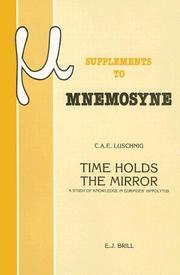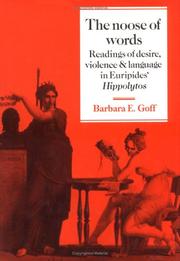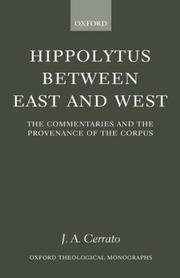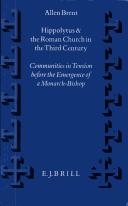| Listing 1 - 10 of 10 |
Sort by
|
Multi
ISBN: 9783110468618 3110468611 3110471396 3110470675 9783110471397 9783110470673 Year: 2016 Volume: Band 19 Publisher: De Gruyter
Abstract | Keywords | Export | Availability | Bookmark
 Loading...
Loading...Choose an application
- Reference Manager
- EndNote
- RefWorks (Direct export to RefWorks)
This edition contains the Greek text of the scholia (vetera and recentiora) and the glosses to Euripides' Hippolytus with a critical apparatus and an apparatus of loci similes. Before the text comes an introduction consisting of two chapters: the former sketches out the history of the exegesis and critical interpretation of the Euripidean text in antiquity as well as the creation and development of this scholiastic corpus, while the other investigates more accurately the manuscripts and the medieval and Renaissance tradition of the scholia to the tragedy. At the end I added the edition of the Triclinian scholia to Hippolytus from Laur. 32.2 together with a metrical apparatus of the choral sections and then a Humanistic paraphrasis, which can be found in Mon. Gr. 258. The purpose of this work is to improve Schwartz's edition both in recensio and constitution of the text. About what concerns the recensio, this was extended to sixteen manuscripts instead of the four used by Schwartz. The reassessment involved not only the more recent manuscripts but also some witnesses dating to the Palaeologan age, disregarded or only partially collated by the former editor.
Euripides. --- Euripides --- Hippolytus (Euripides) --- Euripide --- Scholia. --- Criticism --- Philology --- Ėvripid --- Yūrībīdīs --- Euripedes --- Eŭripido --- Eurypides --- Euripidesu --- אוריפידס --- エウリーピデース --- Εὐριπίδης --- Hippolytos (Euripides) --- Euripidou Hippolytos (Euripides) --- Crowned Hippolytus (Euripides) --- Hippolytos stephanēphoros (Euripides) --- Hippolytus. --- Triclinius.
Book
ISBN: 3110368323 311021539X 3110188171 9783110188172 Year: 2014 Publisher: Berlin ; Boston : De Gruyter,
Abstract | Keywords | Export | Availability | Bookmark
 Loading...
Loading...Choose an application
- Reference Manager
- EndNote
- RefWorks (Direct export to RefWorks)
Im Drama des Euripides verärgert Hippolytos' Verehrung für die Jagdgöttin Artemis die Liebesgöttin Aphrodite so sehr, dass sie seine Stiefmutter Phaidra in Liebe für Hippolytos entbrennen lässt. Die alte Amme der Phaidra entlockt ihr das Liebesgeständnis und informiert Hippolytos, der sich entsetzt abwendet. Phaidra begeht verzweifelt Selbstmord, hinterlässt aber einen Brief, in dem sie Hippolytos als Grund ihres Todes angibt. Daraufhin wird er von seinem Vater Theseus verflucht und verbannt; auf der Flucht kommt er durch Aphrodites Eingreifen grausam ums Leben.Peter Roth legt eine zweisprachige Ausgabe des Hippolytos mit neuer Prosaübersetzung vor. Der ausführliche Kommentar, der keine Griechischkenntnisse voraussetzt, gibt Auskunft zu Sach- und Deutungsfragen; eine ausführliche Einleitung befasst sich mit den Aufführungsbedingungen, dem zugrundeliegenden Mythos, der Sprache und Metrik und allgemeinen Interpretationsfragen. In Euripides' drama, Hippolytus angers Aphrodite, the goddess of love, so much by worshiping the hunting goddess Artemis that she makes his Stepmother, Phaedra fall in love with him. Phaedra's aged nurse persuades her to confess her love and then informs Hippolytus, who recoils in horror. In desperation Phaedra commits suicide, but leaves a letter in which she names Hippolytus as the reason for her death. As a result he is cursed and banished by his father, Theseus. Whilst taking flight he suffers a gruesome death through Aphrodite's intervention.Peter Roth presents a bilingual version of Hippolytus with a new prose translation. The extensive commentary requires no prior knowledge of Greek, providing information on factual issues and questions of interpretation. An extensive introduction deals with performance arrangements, the underlying myth, the language and metrics, and general questions of interpretation.
Euripides. --- Greek Drama. --- Griechisches Drama. --- Hippolytos. --- Hippolytus. --- DRAMA / Ancient & Classical. --- Euripides --- Hippolytus --- Hipòlit --- Hipolitas --- Hipólito --- Hippolütosz --- Hippolyte --- Hippolytos --- Ippolito --- Ippolitu --- 威耳比俄斯 --- Іпполіт --- Хиполит --- Ипполит --- ヒッポリュトス --- هيبوليتوس --- Ἱππόλυτος --- Ėvripid --- Yūrībīdīs --- Euripide --- Euripedes --- Eŭripido --- Eurypides --- Euripidesu --- אוריפידס --- エウリーピデース --- Εὐριπίδης --- Hippolytus - (Mythological character)

ISBN: 9004086013 9004328939 9789004086012 Year: 1988 Volume: 102 Publisher: Leiden
Abstract | Keywords | Export | Availability | Bookmark
 Loading...
Loading...Choose an application
- Reference Manager
- EndNote
- RefWorks (Direct export to RefWorks)
The work is limited to the question of knowledge in Euripides' Hippolytus and seeks to show that one of the major themes of the Hippolytus , as of the Oedipus , is knowledge. In successive chapters these subjects are treated: (1) the witness theme, seeing and knowing, what the senses reveal; (2) fantasies of other worlds created by the characters and how these fantasies reavel the character's perceptions of the world; (3) how Euripides causes his characters to become aware of the shifting meanings of words and how it happens that one statement and its opposite can be predicated of the same individual or act; (4) the desire for and fear of knowledge and the choice of ignorance; (5) the use of generalization as a kind of ignorance; (6) the relation of the character's knowledge to that of the audience. The work offers a new perception of the drama through a detailed examination of this important question that was so warmly debated among the early Sophists.
Drama --- Euripides --- Greek drama (Tragedy) --- Hippolytus (Greek mythology) in literature --- Knowledge, Theory of, in literature --- Tragédie grecque --- Hippolyte (Mythologie grecque) dans la littérature --- Théorie de la connaissance en littérature --- History and criticism --- Histoire et critique --- Euripides. --- Hippolytus (Greek mythology) in literature. --- Knowledge, Theory of, in literature. --- 875 EURIPIDES --- Griekse literatuur--EURIPIDES --- 875 EURIPIDES Griekse literatuur--EURIPIDES --- Euripide --- Tragédie grecque --- Hippolyte (Mythologie grecque) dans la littérature --- Théorie de la connaissance en littérature --- Kennisleer / in de letterkunde. --- Euripide. Hippolyte. --- Connaissance (Théorie de la) / dans la littérature. --- Euripides. Hyppolytus. --- Literature. --- Belles-lettres --- Western literature (Western countries) --- World literature --- Philology --- Authors --- Authorship --- Hippolytus --- Hipòlit --- Hipolitas --- Hipólito --- Hippolütosz --- Hippolyte --- Hippolytos --- Ippolito --- Ippolitu --- Hippolytus (Euripides) --- Hippolytos (Euripides) --- Euripidou Hippolytos (Euripides) --- Crowned Hippolytus (Euripides) --- Hippolytos stephanēphoros (Euripides)

ISBN: 9004072276 9004437231 9789004072275 Year: 1984 Volume: 19 Publisher: Brill Academic Publishers
Abstract | Keywords | Export | Availability | Bookmark
 Loading...
Loading...Choose an application
- Reference Manager
- EndNote
- RefWorks (Direct export to RefWorks)
Naassenes --- Gnosticism --- Hippolytus, Antipope --- Hippolytus --- Hippolytus Antipope --- Hippolytus, --- Hipólite, --- Hippolyt, --- Hippolyte, --- Hippolytos, --- Hippolytus, Concordia, --- Ippolit, --- Ippolito, --- Pseudo-Hippolytus --- Gnosticisme --- Hippolyte (Saint). De refutatione omnium haeresium librorum. --- Hippolytus (Hl.). De refutatione omnium haeresium librorum. --- Cults --- Hippolytus van Rome --- Hippolyte de Rome --- Hippolytus Romanus --- Hippolytus of Rome --- Hippolyte --- Hippolytus, - Antipope, - approximately 170-235 or 236

ISBN: 0521363977 0521033233 0511627319 Year: 1990 Publisher: Cambridge : Cambridge University Press,
Abstract | Keywords | Export | Availability | Bookmark
 Loading...
Loading...Choose an application
- Reference Manager
- EndNote
- RefWorks (Direct export to RefWorks)
This 1990 book is a reading of Euripides' Hippolytos, a central play for the study of Euripides and of Greek tragedy. Dr Goff approaches the play through the techniques of modern literary criticism, including deconstruction and feminism, and is able to shed light on this influential text through her close examination of the language of the play. She divides her discussion into five important critical issues: gender, desire, violence, language and the status of poetry and drama. Throughout she is concerned to site the play in the historical and cultural context of fifth-century Athens, and her analysis of the position of women is particularly illuminating for the role of Phaedra, and for female characters throughout Greek tragedy. This is a provocative book which brings critical insights to one of the most extensively discussed of all Greek tragedies. It will be accessible both to classicists and students of drama and literary theory.
Euripides. --- Desire in literature. --- Hippolytus (Greek mythology) in literature. --- Phaedra (Greek mythology) in literature. --- Tragedy. --- Violence in literature. --- Arts and Humanities --- History --- Hippolytus --- In literature. --- Drama --- Hipòlit --- Hipolitas --- Hipólito --- Hippolütosz --- Hippolyte --- Hippolytos --- Ippolito --- Ippolitu --- 威耳比俄斯 --- Іпполіт --- Хиполит --- Ипполит --- ヒッポリュトス --- هيبوليتوس --- Ἱππόλυτος
Book
ISBN: 0860543323 Year: 1985 Volume: vol 260
Abstract | Keywords | Export | Availability | Bookmark
 Loading...
Loading...Choose an application
- Reference Manager
- EndNote
- RefWorks (Direct export to RefWorks)
726.84 --- 235.3*15 --- Christian antiquities --- -#BIBC:bibl.Reekmans --- Antiquities, Christian --- Antiquities, Ecclesiastical --- Archaeology, Christian --- Christian archaeology --- Church antiquities --- Ecclesiastical antiquities --- Monumental theology --- Antiquities --- Byzantine antiquities --- Christian art and symbolism --- Catacomben. Katacomben. Grafkelders --- Hagiografie: vereringsgeschiedenis --- Hippolytus Antipope --- -Cult --- -Italy --- Rome (Italy) --- -Antiquities. --- 235.3*15 Hagiografie: vereringsgeschiedenis --- 726.84 Catacomben. Katacomben. Grafkelders --- #BIBC:bibl.Reekmans --- Hippolytus, --- Hipólite, --- Hippolyt, --- Hippolyte, --- Hippolytos, --- Hippolytus, Concordia, --- Ippolit, --- Ippolito, --- Pseudo-Hippolytus --- Cult --- Italy --- Antiquities. --- Catacombes de Hippolyte (Saint). --- Catacomben van Hippolytus (Hl.). --- Hippolytus van Rome --- Hippolyte de Rome --- Hippolytus Romanus --- Hippolytus of Rome --- Hippolytus --- Hippolyte

ISBN: 0199246963 019169763X 9780199246960 Year: 2002 Publisher: Oxford Oxford university press
Abstract | Keywords | Export | Availability | Bookmark
 Loading...
Loading...Choose an application
- Reference Manager
- EndNote
- RefWorks (Direct export to RefWorks)
Church history --- Hippolytus, --- Authorship --- 276 =75 HIPPOLYTUS --- -Christianity --- Ecclesiastical history --- History, Church --- History, Ecclesiastical --- History --- Christianity --- Griekse patrologie--HIPPOLYTUS --- Hippolytus Antipope --- -Authorship --- -Griekse patrologie--HIPPOLYTUS --- Apostolic Church --- Church, Apostolic --- Early Christianity --- Early church --- Primitive and early church --- Primitive Christianity --- Fathers of the church --- Great Apostasy (Mormon doctrine) --- Hippolytus van Rome --- Hippolyte de Rome --- Hipólite, --- Hippolyt, --- Hippolyte, --- Hippolytos, --- Hippolytus, Concordia, --- Ippolit, --- Ippolito, --- Hippolytus Romanus --- Pseudo-Hippolytus --- Authorship. --- Hippolytus of Rome --- Hippolytus --- Hippolyte --- Church history - Primitive and early church, ca. 30-600. --- Hippolytus, - Antipope, - approximately 170-235 or 236 - Authorship --- Hippolytus, - Antipope, - approximately 170-235 or 236

ISSN: 0920623X ISBN: 9004102450 9004312986 9789004102453 Year: 1995 Volume: 31 Publisher: Leiden Brill
Abstract | Keywords | Export | Availability | Bookmark
 Loading...
Loading...Choose an application
- Reference Manager
- EndNote
- RefWorks (Direct export to RefWorks)
Allen Brent examines the significance of the Hippolytan events in the life of the Roman Church in the early third century. Developing the thesis of at least two authors in the Hippolytan corpus, he proposes a new, redactional explanation of the relation between these different authors and the theological and social tensions to which their work bears witness. Brent reconstructs a picture of the community that contextualizes both the Hippolytan literature and in particular the Statue, for which he proposes a new interpretation as a community artefact though universally misjudged as a monument to an individual. Tertullian's relationship with Callistus is finally re-assessed. This work is thus an important contribution to new understandings of a period critical both for the development of Church Order and embryonic Trinitarian Orthodoxy.
Christian literature, Early --- Church history --- Greek authors --- History and criticism. --- 27 <37> "02" --- -Church history --- -#GROL:SEMI-276-05 Hipp --- Christianity --- Ecclesiastical history --- History, Church --- History, Ecclesiastical --- History --- Early Christian literature --- Patristic literature --- Kerkgeschiedenis--Rome. Oud-Italië--?"02" --- -History and criticism --- Hippolytus Antipope --- -Ligorio, Pirro --- Statues --- #GROL:SEMI-276-05 Hipp --- Greek authors&delete& --- History and criticism --- Hippolytus, --- Ligorio, Pirro, --- Ligorio, Pyrro, --- Ligorium, Pyrrhum, --- Ligorius, Pyrrhus, --- Ligorius, Pyrrus, --- Pirro Ligorio, --- Hipólite, --- Hippolyt, --- Hippolyte, --- Hippolytos, --- Hippolytus, Concordia, --- Ippolit, --- Ippolito, --- Pseudo-Hippolytus --- Statues. --- Hippolytus van Rome --- Hippolyte de Rome --- Hippolytus Romanus --- Hippolytus of Rome --- Hippolytus --- Hippolyte --- Statuary --- Monuments --- Sculpture --- Apostolic Church --- Church, Apostolic --- Early Christianity --- Early church --- Primitive and early church --- Primitive Christianity --- Fathers of the church --- Great Apostasy (Mormon doctrine) --- Greek authors. --- Primitive and early church. --- 30 - 600 --- Early Church Period --- Primitive and Early Church Period

ISBN: 0674995333 9780674995338 Year: 1995 Volume: 484 2 Publisher: Cambridge (Mass.): Harvard university press
Abstract | Keywords | Export | Availability | Bookmark
 Loading...
Loading...Choose an application
- Reference Manager
- EndNote
- RefWorks (Direct export to RefWorks)
Euripides (c. 485-406 BCE) has been prized in every age for his emotional and intellectual drama. Eighteen of his ninety or so plays survive complete, including Medea, Hippolytus, and Bacchae, one of the great masterpieces of the tragic genre. Fragments of his lost plays also survive.
Hippolytus (Greek mythology) --- Andromache (Legendary character) --- Hecuba (Legendary character) --- Mythology, Greek --- Drama. --- -Andromache (Legendary character) --- Greek mythology --- Drama --- Euripides --- -Translations into English --- Translations into English. --- Greek drama (Tragedy) --- Greek drama (Satyr play) --- Greek drama --- Mythology, Greek, in literature --- Tragedy --- Andromache --- Hecuba, --- Heracles --- Hippolytus --- Satyric drama, Greek --- Hipòlit --- Hipolitas --- Hipólito --- Hippolütosz --- Hippolyte --- Hippolytos --- Ippolito --- Ippolitu --- 威耳比俄斯 --- Іпполіт --- Хиполит --- Ипполит --- ヒッポリュトス --- هيبوليتوس --- Ἱππόλυτος --- Alcaeus --- Alcides --- Alkaios --- Alkeidēs --- Earcail --- Eracle --- Eracles --- Heracle --- Herakl --- Heraklej --- Hēraklēs --- Héraklész --- Heraklis --- Herakliu --- Heraklo --- Hērakls --- Héthacl'ye --- 赫拉克勒斯 --- ヘーラクレース --- הרקולס --- 헤라클레스 --- Херакле --- Херакъл --- Гэракл --- Геракл --- هرکول --- هيراكليس --- Ἀλκείδης --- Ἀλκαῖος --- Ἡρακλῆς --- Ecuba, --- Hecabe, --- Hécube, --- Hekaba, --- Hekabē, --- Hekabo, --- Hekuba, --- 赫库芭, --- ヘカベー, --- הקובה, --- 헤카베, --- Гекаба, --- Гекуба, --- Хекаба, --- Хекуба, --- هکابه, --- هيكوبا, --- Ἑκάβη, --- Ėvripid --- Yūrībīdīs --- Euripide --- Euripedes --- Eŭripido --- Eurypides --- Euripidesu --- אוריפידס --- エウリーピデース --- Εὐριπίδης --- Andromache, --- Andrómaca --- Andromacha --- Andromaha --- Andromahi --- Andromaka --- Andromakhe --- Andrómakka --- Andromaque --- 安德洛玛刻 --- アンドロマケー --- 안드로마케 --- Андромаха --- Андрамаха --- آندروماخه --- أندروماكا --- Ἀνδρομάχη --- Greek literature --- Dionysia --- Hercules --- Euripides - Translations into English. --- Hippolytus (Greek mythology) - Drama. --- Andromache (Legendary character) - Drama. --- Hecuba (Legendary character) - Drama. --- Mythology, Greek - Drama. --- Tragedies. - gsafd --- Hippolytus (Greek mythology) - Drama
Book
ISBN: 9781463202187 1463202180 Year: 2015 Publisher: Piscataway Gorgias Press
Abstract | Keywords | Export | Availability | Bookmark
 Loading...
Loading...Choose an application
- Reference Manager
- EndNote
- RefWorks (Direct export to RefWorks)
The first English translation and study of St. Hippolytus' fascinating, early third-century commentary 'On the Song of Songs'. Important for the history of biblical interpretation, rival identities of early Christians, liturgy, and mystagogy in the pre-Constantinian church.
276 =75 HIPPOLYTUS --- 223.6 --- 223.6 Cantique ou Cantique des Cantiques --- 223.6 Hooglied --- Cantique ou Cantique des Cantiques --- Hooglied --- 276 =75 HIPPOLYTUS Griekse patrologie--HIPPOLYTUS --- 276 =75 HIPPOLYTUS Patrologie grecque--HIPPOLYTUS --- Griekse patrologie--HIPPOLYTUS --- Patrologie grecque--HIPPOLYTUS --- Hippolytus Romanus --- Hippolytus of Rome --- Hippolytus --- Hippolytus van Rome --- Hippolyte --- Hippolyte de Rome --- Hippolytus, --- Hipólite, --- Hippolyt, --- Hippolyte, --- Hippolytos, --- Hippolytus, Concordia, --- Ippolit, --- Ippolito, --- Pseudo-Hippolytus --- Bible. --- Aga-sŏ (Book of the Old Testament) --- Asma Asmatōn (Book of the Old Testament) --- Cantar de los Cantares de Salomón (Book of the Old Testament) --- Cântarea-a Cântărilor (Book of the Old Testament) --- Cantica Canticorum (Book of the Old Testament) --- Canticle of Canticles (Book of the Old Testament) --- Canticles (Book of the Old Testament) --- Cantico dei Cantici (Book of the Old Testament) --- Canticum Canticorum Salomonis (Book of the Old Testament) --- Cantique des Cantiques (Book of the Old Testament) --- Énekek Éneke (Book of the Old Testament) --- Erg Ergotsʻ Soghomoni (Book of the Old Testament) --- Hohelied (Book of the Old Testament) --- Hooglied (Book of the Old Testament) --- Lied der Lieder (Book of the Old Testament) --- Musthikaning Kidung anggitane Sang Prabu Suleman (Book of the Old Testament) --- Musthikaning Kidung (Book of the Old Testament) --- Nashīd al-Anāshīd (Book of the Old Testament) --- Nashīd al-Anshād (Book of the Old Testament) --- Shir ha-Shirim (Book of the Old Testament) --- Solomon, Song of (Book of the Old Testament) --- Song of Solomon (Book of the Old Testament) --- Song of Songs (Book of the Old Testament) --- Commentaries --- History and criticism.
| Listing 1 - 10 of 10 |
Sort by
|

 Search
Search Feedback
Feedback About UniCat
About UniCat  Help
Help News
News